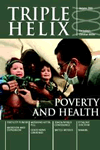In 1996, there was a severe downturn in the Russian economy after the collapse of communism. There was so little money available for the provision of health care that people dying of cancer in Samara, Russia's 4th largest city, were being given no medical and nursing care at all. The hospital service had stopped admitting these patients. So they received no radiotherapy, no chemotherapy, and no hospital nursing care, even if they needed it. There was no community nursing service such as we have in Britain. Moreover, there was no morphine for pain relief.
The problem was not lost on Christian doctors and nurses attending the Samara Central Baptist Church. They decided to visit the dying cancer patients after work hours in their own homes, on an unpaid basis, to try to bring them help on every level - physical, emotional, mental and spiritual. After three years they found the need had grown even greater. So they applied to the civic and medical authorities for permission to be constituted formally, as The Samara Hospice Team.
The most urgent need was for training. There had never been any training in Palliative Care for doctors or nurses in Samara, either at undergraduate of postgraduate levels. This was probably the situation all over the former Soviet Union. Indeed, until 1993, an act of parliament in the USSR forbade doctors discussing fatal illness with patients, reflecting the atheism of the political system and it lack of any hope beyond the grave.
Help came thanks to a visiting team from Switzerland, in Samara to help restructure health services. On their return they contacted their local Palliative Care Physician. So it was that Dr Nathalie Steiner, from Geneva, Switzerland, and Dr Bruce Cleminson, GP and Macmillan doctor for the Shetland Islands, went to Samara, with support from the Shetland Aid Trust in Britain, and CDK in Switzerland. At the invitation of the Samara Hospice Team, in June 1999, they ran the first three-day Hospice Conference. In 2000, the Samara Hospice organised a further three-day conference, this time for more than 100 people from all over Russia. One outcome was formation of The Association of Russian Hospices, to strengthen the hand of those involved in negotiations with local and national governments about funding and the supply of essential medicines.
I had the opportunity to visit Samara in 2001 as part of the teaching programme. We visited 'Olga' in her early 40s, in her own home. We found she was pain and symptom-free, but very unhappy. She felt that God was punishing her with cancer. We were able to reassure her that God loved her despite anything she had done. Jo, a specialist hospice nurse from Edinburgh and a member of the Shetland Aid Trust team, talked to her in depth about what her seven year-old son knew about her illness, and what would happen to him when she died.
We have been invited to continue the teaching for the Samara Hospice Team. Part of the task we will be to train the polyclinic doctors and nurses in the care of the dying in the community. A three-day conference is planned and as well as local staff training it will include training for the staff from three other hospices that have sprung up in the Samara region. As well it will include doctors and nurses from Ulianovsk, Saratov, and Astrakhan in southern Russia.
My thoughts
Although we sometimes complain about the NHS, all the essential drugs for palliative care, and most other drugs for other medical conditions, are readily available. In Samara there is still difficulty in getting the medicines needed for effective palliative care. There is some injectible morphine, but no oral morphine - sustained release or normal release forms. Other drugs are either scarce or often not available at all. Even if they can be obtained, the family may not be able to afford them.
Our incomes in the West ensure that anybody with a job, or even the old age pension, has something with which to pay the bills and buy food. In Russia, the weekly statutory national minimum wage is about 250 roubles. At 42 roubles to the pound, this is about £5.95. 70% of the people of Samara live below the poverty line. Their cost of living is cheaper but 250 roubles does not even buy enough food for one person, let alone allow family to survive. One kilo of apples alone costs about 30 roubles.
































